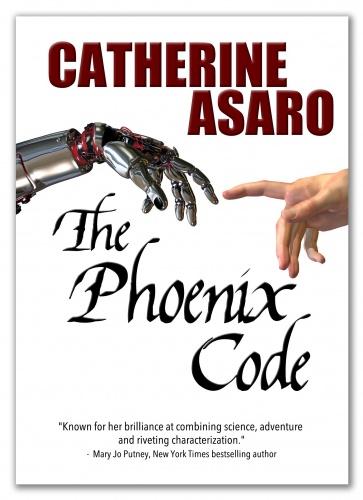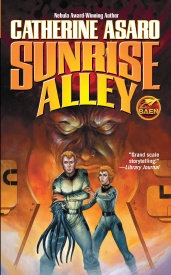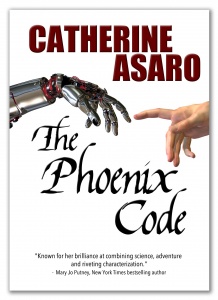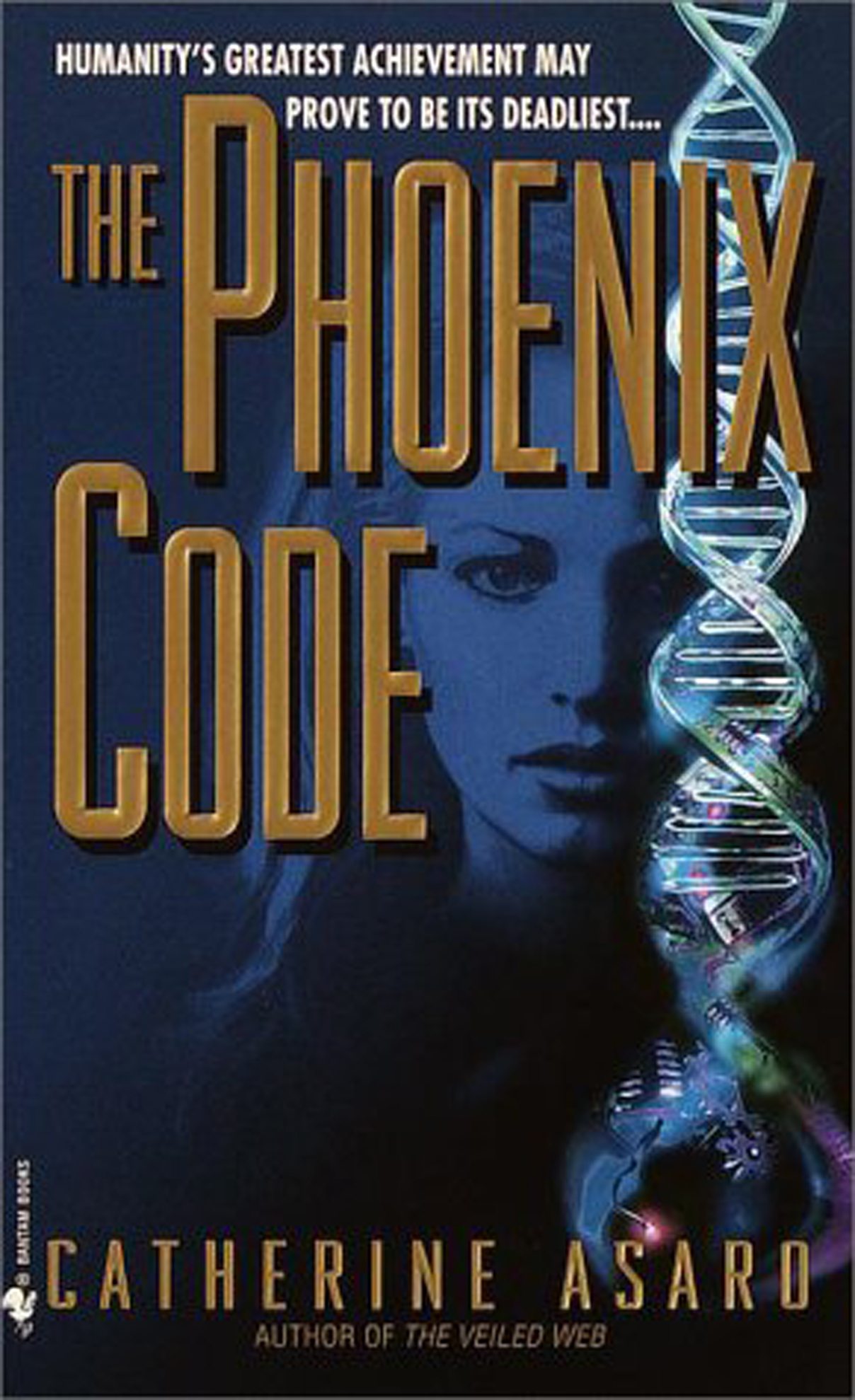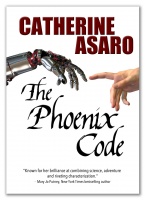The Phoenix Code
Part of the Stand Alone Stories
Megan O’Flannery, an expert in artificial intelligence, accepts the job as lead investigator on a secret, military project. The previous research group created four androids, but resigned when all but one died. The one survivor, who calls himself Ander, has the capabilities of a high-speed computer, superhuman reflexes and strength, and the deceptive looks of an angelic Adonis—but he behaves like an angry, unpredictable adolescent. Then the robotics genius, Raj Sundaram, joins the project. Megan finds herself attracted to him but fears that Raj may have his own hidden agenda. Ander’s fierce animosity towards Raj turns the situation even more deadly.
Kidnappings and pursuits by mercenaries ensue. Megan, Ander, the mysterious Raj must fight for their survival, while Megan struggles to comprehend the motives of her companions.
A fast-paced thriller of robotics and love by the Nebula-Award-winning author of the highly acclaimed Skolian Empire/Ruby Dynasty series, five fantasy novels, and four sf thrillers, including THE PHOENIX CODE.
Start Reading
The Phoenix Code
Excerpt
Jump to Ordering Options ↓
Chapter 1: The Offer
People packed the auditorium. Every seat was filled and more listeners crammed the aisles. An unspoken question charged the room: were today’s speakers revealing a spectacular new future for the human race—or the end of humanity’s reign as the ruling species on Earth?
This session was a diamond in the crown of IRTAC, the International Robotics Technology and Applications Conference in the year 2021, held at Goddard Space Flight Center in Maryland. As chair of this session, Megan O’Flannery had chosen the speakers. She was sitting now at a table on the right edge of the stage. The man answering questions, Arick Bjornsson, stood center stage.
“The genie is out of the bottle,” Arick was saying. “Our machines are becoming intelligent. They won’t surpass us today or tomorrow, but it is only a matter of time.”
Listening to him, Megan pondered her own conflict. She worked on artificial intelligence for androids—humanlike robots. Usually she looked to the future with optimism. Sometimes, though, she wondered if they were only creating ways to magnify the human capacity for destruction. She might soon face a decision that forced her to confront both sides of the issue: could she use the fruits of her intellect to create machines meant to kill?
She glanced over the audience. The scientists came in all sizes, shapes, and ages. Most wore casual clothes: jeans, shirts or blouses, jumpsuits. The conference chair, a distinguished man in a well-cut suit, was a few rows up from the stage. Several men and women sat with him, other high-ranking officials. Megan recognized them all, except for the fellow on his right.
The stranger had dark eyes and tousled black curls. His faded jeans had raveled at the knees, and his denim shirt was frayed. A black leather jacket with metal studs lay haphazardly over his legs. The gold watch on his wrist caught the light with prismatic glints that suggested diamonds. As he listened to the talk, emotions played across his mobile features: skepticism, interest, outrage, amusement. He glared and crossed his arms at one point. Later, he relaxed and nodded with approval. The dramatic flair of his handsome face fascinated Megan.
A woman sitting in front of the man suddenly swiped her hand past her face. It looked as if she were bedeviled by one of those irksome gnats that infiltrated the auditorium. As she caught the bug, the man reached forward and tapped her wrist. She turned with a start, reflexively opening her fist. Then her gaze flicked up to follow the liberated gnat. The man said something, an apology it looked like, and sat back. After giving him a bemused look, she shook her head and returned her attention to the talk. It all piqued Megan’s curiosity.
Arick finished and the audience applauded. After he took his seat, Megan stepped up to the podium. “That concludes this session. The media people tell me they’ll have copies of the proceedings tomorrow. You can get it as a holograph, in videos, or in memory cubes. A paper copy should be available in a few weeks.” She grinned at them, this collection of her colleagues, friends, and adversaries. “That’s it, folks. All we have left is the banquet tonight. So let’s go eat and be merry.”
Laughter rippled through the audience, followed by a general murmur as people began talking, putting on coats, or seeking out one another to continue spirited debates. Megan looked around for the man with the leather jacket, thinking to introduce herself.
He had disappeared.
***
A long day, Megan thought as she left the auditorium. Her hair was coming down, red tendrils curling around her face. She pulled the heavy tresses free, then gathered up the waist-length mane and pinned it back on her head in a neat roll. She wished her energy weren’t at such a low. Her work day hadn’t ended yet; she had another meeting, possibly an important one to her career.
Tired or not, though, she thrived on this life. Robots had fascinated her since her childhood in Bozeman, Montana. She recalled toddling after a toy cat that stalked around the spacious living room of her parents’ house. It hid behind a door, then attempted to pounce. She rocked with laughter when it toppled in an undignified heap of fur, limbs, and blinking lights. She had spent the next hour taking out its batteries and trying to put them back.
So she grew up, earned a B.S. in computer science at Montana State University, and went to Stanford for graduate school. Now at thirty-five, she was a professor at MIT. But the delighted little girl still lived inside of her, marveling at her toys.
Her enthusiasm bemused her mother, who had once asked, But Megan, why make robots that look like people? What’s wrong with the humans we already have?
It’s a new science, Megan had answered. A new world, Mom. Maybe even a new species.
Her mother had given her The Look then, the one that Megan had long ago decided never boded well. Regarding Megan with the large blue eyes that her daughter had inherited, she said, You know, dear, there are much more enjoyable ways to make new humans, and you don’t have to work nearly so hard as you do in your lab.
All Megan could manage was an aghast, Mom! One’s silver-haired mother wasn’t supposed to say such things, let alone look so pleased with herself, smiling like a cherub.
She supposed that if she would get married and make some new humans of the traditional kind, her mother would ease up. It wasn’t that Megan had no interest in marriage; she just hadn’t found the right man. Although her parents had liked most of her past boyfriends, she always had a sneaking suspicion they were sizing the poor fellows up as potential grandchild-production sources.
A voice interrupted her reverie. A man and woman were approaching. So, she thought. This is it.
“Dr. O’Flannery,” the man said as they came up to her. His styled haircut, expensive blue suit, and businesslike manner made a sharp contrast to the more informal clothes most scientists wore at the conference. The woman had gray hair and a piercing intelligence in her gaze. Megan recognized her, but she couldn’t remember from where.
The man extended his hand. “I’m Antonio Oreza. Tony.”
Megan shook his hand. “Hello. Are you from Mind-Sim?” She had agreed to meet their representatives after the session.
“That’s right. I’m the vice president in charge of research and development.” He indicated the woman with him. “This is Claire Oliana, from Stanford. She consults for us.”
MindSim had sent a VP to talk to her? And Claire Oliana? The Stanford professor was the first person to receive the Nobel prize for work in the development of machine intelligence.
Megan didn’t feel so tired anymore.
***
The vending cafe had blue walls and tables covered by blue and white checked cloths. As Megan sat down with Tony and Claire, a vending robot bustled over, rolling on its treads. It stood about four feet tall, with a domed head and tubular body. The droid had only a rudimentary AI, one limited to serving food—though within that narrow range it could develop a personality. Its panels displayed cheerful holos of meals that looked far more delectable than anything Megan had actually eaten here.
“Good afternoon,” it said. “I’m Jessie.” Its head swiveled from side to side as it surveyed them, giving it an earnest appearance. It made Megan smile, though she knew it was just mapping their positions with the cameras in its eyes.
“Do you have coffee?” Tony asked.
“I’ve a delicious menu to select from,” Jessie assured him. “French vanilla, cappuccino, Brazilian dry roast, decaf supreme, and today’s special, Martian bug-eyed-monster deluxe.”
Megan laughed. “Monster deluxe? What is that?”
“It has an unusually strong caffeine content,” Jessie said. “The night shift in the Science Operations Facility programmed it into me at four this morning. They required a strong restorative to make their continued functioning possible.”
Claire smiled. “That much caffeine would send me into orbit. Decaf for me.”
“French vanilla here,” Tony said.
“Very wise choices,” Jessie said. A red cup plopped into a recess in its stomach and began filling with coffee.
“I’ll take the Martian deluxe,” Megan decided.
“As you wish.” If a machine could blink its lights with doubt over the wisdom of a customer’s choice, Jessie was doing it. Megan suspected that the SOF night shift had also programmed some mischief into the droid’s personality.
After Jessie served their coffee, Tony clicked his money card into the robot. Jessie’s lights sparkled as it spoke. “I hope you enjoy your meal.” Its head swiveled to Megan. “Please inform me if you need any further assistance.”
“Like an ambulance?” Megan couldn’t resist teasing the droid. It probably had a minimal humor mod to make it more personable to customers.
Its lights twinkled. “I serve only the best food, ma’am.” Then it rolled away, playing a tinkling melody like the ice cream trucks in the neighborhood where she had grown up. It took up position by the wall and swiveled its head around, surveying the cafe like a carnival barker looking for new marks.
With a laugh, Claire said, “I think the night shift in the Science Operations Facility have been staying up too late.”
Megan took a swallow of her drink. The stuff tasted like rocket fuel. “They know their coffee,” she said with approval.
Tony was watching her. “I can’t help but wonder, Dr. O’Flannery, how you would program a robot like that.”
“I don’t work with utility droids.” She had no doubt Tony knew exactly where her interests lay. With a smile she added, “And you should call me Megan.”
Both Tony and Claire seemed pleased at this nonresponse. Tony leaned forward. “Megan, what would you say to a functional android for your research?”
She resisted the urge to shout Yes! Although MindSim was on the cutting edge of such research, vague rumors about disasters there in hidden projects made her wary. She made her voice casual, but friendly. “The problem is, no one has an android hanging around that wants a brain.”
“Well, no.” Tony beamed as if he were about to deliver great news. “However, MindSim has funding in that area.”
After researching MindSim in preparation for this meeting, Megan knew that both they and their major competitor, Arizonix Corporation, had won several Department of Defense grants for their work in AI and robots. She also suspected she would need a security clearance to hear any details of the projects.
She chose a neutral response. “MindSim does good work.”
Tony spoke with polished enthusiasm. “We’d like you to be part of our team.”
“Suppose you had the chance to lead such a project?” Claire asked.
Megan stared at her, then took a long swallow of her rocket fuel. She would jump at such an opportunity—if it didn’t have a catch. Why had they come to her? They already had DOD funds, so they must have started out with a chief scientist as the principal investigator on the grant proposal. What had happened?
“It would depend on the circumstances,” she said.
“Come out to MindSim and take a look,” Tony said. “We’ll show you around.”
Megan wasn’t sure what to say. She liked her position at MIT. She had grants, graduate students, resources, colleagues, and a growing reputation in the field. The prestige didn’t hurt either. But Tony and Claire were dropping seductive hints. She would give almost anything to work with a real android instead of being confined to running simulations on a computer. A visit to MindSim wasn’t a commitment. If nothing else, an offer from them might inspire MIT to give her a raise. She leaned forward. “Let’s talk.”
***
Goddard Space Flight Center covered many acres of land, with the rolling fields of the Beltsville Agricultural Center to the east and the Baltimore-Washington Parkway to the west. Stretches of forest separated the buildings, and deer wandered everywhere.
Lost in thought, Megan ambled down a back road. She had always enjoyed walking, and this gave her a chance to mull over the MindSim offer. A lake stretched out on her right, basking in late afternoon sunlight. The day had that golden, antique quality that came late in the year. Birds paddled in the water: gray, speckled brown, iridescent green, and the odd white goose with an orange beak. Farther down the shore, a man stood surrounded by ducks. At first she wasn’t sure why they were squawking at him. Then she saw that he was scattering bread crumbs.
She was about to continue on her way when she recognized him: the intriguing fellow from the audience. He looked over six feet tall, with black hair and dark eyes. A palmtop computer hung from his scuffed leather belt. He watched the birds with a half-smile, as if he hadn’t decided whether it would insult their egos if he laughed at them.
Megan changed direction and headed toward him. As she came closer, though, she hesitated. His muscular build and handsome face didn’t fit her image of a robotics expert. His hair curled over his ears and down his neck, longer than men wore nowadays, but clean and glossy with health. On most people, it would have looked sloppy; on him, it worked. The same was true of his clothes. What his long legs did for those raveling jeans would have brought their makers a fortune if they could have packaged the quality. It made her hang back, as if he were a holovid actor she would normally never have had the chance to meet.
Suddenly he looked up. “Good afternoon, Dr. O’Flannery.” It was hard to place his background; his facial features evoked the Celts, his coloring could be Indian, and his rich accent, like molasses on a summer afternoon, was undeniably from the American South.
“Hi,” Megan said.
He tossed the last of his bread into the lake. Flapping and squawking, the birds waddled after the morsels.
“Such hungry things,” Megan said. “Greedy, even.”
His grin crinkled the fine lines around his eyes. “They’d eat ten loaves if I brought them.”
Oh, Lord. That smile defined the word “devastating.” It lit up his face.
“See?” He pointed at the sky. “They’re leaving.”
She looked up, as much to regain her composure as to see what he meant. A V-shape of birds was arrowing across the sky. “Well, yes.” More collected now, she turned back to him. “Flying south for the winter, I imagine.”
He indicated the birds floating on the pond, then held up his hand as if to offer them more delicacies. They paddled industriously toward him until they realized he was bluffing. Then they drifted off again. His gold watch caught rays of the sun, glittering with discreet diamonds.
“They don’t cheat,” he said.
“I’m sure they don’t.” Megan had no idea what they were actually talking about, but she doubted it was birds. Whatever the subject, she loved his voice. Deep and throaty, it rumbled like music, sometimes drawling, other times resonant. “Did you enjoy the session this afternoon?”
“I suppose.” Ah suhppose. “You should have given a talk. You do better work than the lot of them combined.”
That caught her off guard. “Thank you.” She hesitated. “I’m afraid I don’t know your name.”
He considered her for a long moment. Then he said, “Raj. Call me Raj.”
“Is that your name?”
“Well, no. Yes. At times.”
“Raj isn’t your name?”
“My mother calls me Robin.” He spread his hands as if to say, What can a person do?
Megan smiled. She could relate to that situation. Her father still called her Maggie-kitten. She didn’t mind it from him, but it would land anyone else in the lake. “What do other people call you?”
“All sorts of things.” He rubbed his ear. “I wouldn’t repeat most of them.”
She gave it another try. “So Raj is the name on your birth certificate.”
“No.”
Megan couldn’t help but laugh. “You know, this is like pulling teeth.”
His lips quirked into a smile. “My birth certificate, from the fine state of Louisiana, says Chandrarajan.”
She stared at him. “You’re Chandrarajan Sundaram?”
“Please don’t look so shocked. I assure you, I’ve treated the name well.”
Good Lord. This was the reclusive eccentric who had revolutionized the field of robotics? Unattached to any university or institute, he worked only as a consultant. Corporations paid him large amounts of money to solve their problems. She had heard that one had given him a million, after he made their disastrous household robot work in time for its market release, saving the company from bankruptcy.
His reputation gave her a context for his conversation. Rumor said he paid a price for his phenomenal intellect; no one could think like him, but he had the devil of a time expressing those thoughts. From what she had heard, his mind didn’t work in linear thought processes, so he often made jumps of logic that left his listeners confounded.
It astounded her that he had come to the conference. She had invited him, of course. He had been a top name on her hoped-for speakers list. She had already known, however, that he rarely attended such meetings. It hadn’t surprised her when he declined.
Yet here he stood.
“It’s actually Sundaram Chandrarajan Robert,” he said.
“Your name?”
His voice became subdued. “My father followed the custom of giving me his name, followed by my own. But in this country, it’s easier for us to have the same last name. So we use Sundaram. Robert is from my mother’s side.”
She wondered why the mention of his father caused his mood to turn so quiet. “It’s a beautiful name.”
Raj watched her with a long, considering look. “Then there are geese,” he mused.
“Birds again.” She gave a gentle laugh. “You know, I have no idea what we’re talking about.”
Amusement lightened his voice. “Most people don’t respond this way to me.”
“What do they do?”
“Nod. Look embarrassed. Then leave as fast as they can.”
“Is that what you want?”
“It depends.” He had all his attention focused on her now.
“On what?”
“Hair color.”
“Hair color?” This conversation was making less and less sense by the minute. It was fun, though.
“Red,” he said. “Yours is red.”
“Well, yes. My hair is definitely red.”
“Red flag.” He walked over to her. “For stop.”
It took a moment, but then she realized he was making a joke, using it to ask if she wished he would leave. Given that he had come over to her as he said it, she suspected he didn’t want to end their conversation. Of course, she could be wrong. But he reminded her of her father, an absented-minded architect who tended to talk in riddles during his more preoccupied moods.
Megan put her hands on her hips. “I do believe, sir, that you’re teasing me.”
His lips quirked up again. “It could be.”
She could tell he was still waiting for her response to his unasked question. “I’m sure my hair doesn’t say ‘stop.’ ”
A grin spread across his face. “You’re quick.”
Ah, that smile. It was fortunate this man lived as a recluse. Otherwise, womankind wouldn’t be safe from either his dazzling smile or his nutty conversation. “Not that quick. I still don’t get it about the birds.”
“Winter is coming and they have a long way to go.” He sounded more relaxed now. “So they eat a lot. But they aren’t greedy. And they don’t cheat. They only take what they need.” His smile faded. “Humans could learn a lot from them.”
Megan wondered what sort of life he had lived, that he saw the world in such terms. Then again, given the immense value of his intellect and personal wealth, people probably wanted whatever they could get from him.
“Perhaps we could,” she said.
“They followed me around too, you know,” he said. “I sent them away.”
Her brow furrowed. “The birds?”
“The suits from MindSim.”
“They offered you a job?”
“Yes. I told them no.” Then he added, “But perhaps I will consult for them, after all.”
Her pulse jumped. Was he offering her the chance to work with him? She kept her voice calm, afraid that if she appeared too eager, she would scare him off. “Maybe you should.”
He offered his hand. “I’m pleased to have met you, Dr. O’Flannery.”
She shook his hand. “And I you. Please call me Megan.”
“Megan.” He nodded. Then he turned and started down the road. After a few steps, he turned back as if he had remembered something. “Oh. Yes. Good-bye, Megan.”
She raised her hand. “Good-bye.”
Then he went on his way, leaving her to wonder just what was going on out at MindSim.
end of excerpt
The Phoenix Code
is available in the following formats:
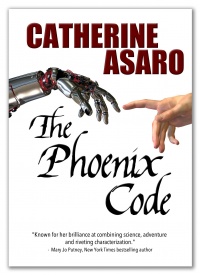
Digital:
Audio:
- This title is not currently available in audio format

